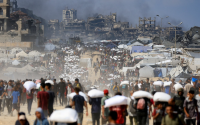In a network of mud-bricked sweatshops in the lawless Haryana area of New Delhi, India, this newspaper found dozens of children cramped together producing clothes for the UK high street.In one sweatshop, children were finishing a summer dress, now on sale for £16.99 in 250 Select clothing stores across Britain. 'I was brought here from Bihar [the poorest state in India],' said Shafiq who first claimed to be 14 but later admitted to being 11.
'All my family know is I have come to Delhi to work. They were paid a fee for me and I was brought by road from Patna with 40 other children. If they knew I had ended up here they wouldn't have let me go. But now I can't telephone them - they live in a small village. I am going to work off the fee the owner paid for me so I can go home but I am working for free. The supervisor has told me because I am learning I don't get paid. It's been like this for four months. I've had only two days off. And that was only because the factory was flooded.'
Prakesh, who is also on 'probation' and working for free, claims to be 13 but his colleagues jokingly claim he is closer to nine. He bares fresh wounds on the backs of his legs but while his supervisor looks on, denies he has been beaten.
'I want to work here. I have somewhere to sleep at night,' he says looking furtively behind him. 'The work is hard and my back hurts from crouching over the material but I am learning. I often hear other children playing in the street outside but it is my job to work. My parents needed the money for the other members of my family and they sold me. It is my duty to stay here. Another boy ran away. The supervisor told me he is in prison. I don't want to go to prison.'
Select, one of the fastest growing retailers in Britain, told The Observer it was appalled to learn some of its clothing was being finished off by child labourers. 'The whole idea of child trafficking is utterly unacceptable and the thought that we could be involved has very much upset us all,' said John Sunderland, a director. 'We had visited the factory and we were totally confident that everything was absolutely straight.'
It appears Majgenta, the Indian company contracted to make the Select dresses had sub-contracted sewing some sequins on the almost-finished garments to another firm. Majgenta has pledged a full inquiry in the wake of The Observer revelations and point out that fewer than two per cent of the garments it exports to the UK require the application of sequins.
In a statement given to this newspaper, Select said: 'The supplier concerned has denied all the allegations. They have suggested that the photographs we have been shown depict surplus or faulty stock that our supplier had disposed of, and not stock supplied to Select. We have sought further explanation from them in this regard.'
Majgenta says it uses only approved sub-contractors which are obliged to meet strict ethical and moral standards. It has threatened to fire its subcontractors if its investigation finds evidence of wrongdoing.
But tracing the trail to the sweatshops is not easy. Akesh, the supervisor of the sweatshop, said his orders were contracted by word of mouth only, leaving no incriminating paper trail.
'The workers here are well treated,' he said. 'We feed them and they sleep here, it is comfortable, more comfortable than many of the other units around here. We have water tanks here. These children are not slaves; they are working for their families in the north.'
But his comments have drawn an angry response from child protection groups. 'The uncovering of this sweatshop is obviously a major blow for a leading British firm but the reality is most high street firms in Britain are playing exactly the same game, cutting costs and not considering the consequences,' said Bhuwan Ribhu, a New Delhi lawyer and activist for the campaign group Global March Against Child Labour.
'They know what outsourcing to India means. The cheapness and accessibility of these garments has created a life of servitude, a living nightmare, for hundreds of thousands of children who are forced to sew them.'
In another sweatshop, The Observer found more children completing a major sub-contracted order fora British firm, the Birmingham-based fashion label Roman Originals, whose upmarket garments are popular purchases in English market towns.
'We were horrified to see these pictures and immediately launched an investigation into our suppliers,' Roman Originals said in a statement, adding it had cancelled its contract immediately.
'We had visited the suppliers and were presented with an adult-only workforce and practices that satisfied our standards. It appears that our supplier sub-contracted a portion of the business and this is where the problem occurred."
In the past few months Delhi police and Indian Labour Department officials have made a series of raids on garment factories in the Indian capital and rescued hundreds of minors working in embroidery units
Most campaigners, however, remain sceptical, claiming the raids are simply 'PR stunts' designed to show something is being done about the problem. According to Global March, the fight against child labour is becoming increasingly dangerous.
'The police have to rely on rare tip-offs because it is difficult to track down child workers, with employers setting up small units in crammed back alleys, where the children are hidden from public eye,' Ribhu said.
'But even before the search parties get to the factories the owners are tipped off and many of the children are cleared out. We have lost a number of activists, murdered in the course of their duties, others have been dragged in chains behind cars and had threats made against their families.'
Professor Sheotaj Singh, the co-founder of the Dayanand Shilpa Vidyalaya, a Delhi-based rehabilitation centre for rescued child workers, believes that as long as cut-priced embroidered goods are sold in catalogues and stores across Europe, major retailers will continue to inundate India's main export firms with lucrative contracts.
'The facts are straightforward for the consumer,' Singh said. 'Cut-price stores in the West can cut prices only by ordering in bulk, huge numbers of garments, and somewhere along the chain of suffering and exploitation enslaved children are inevitably going to be involved.
'Everything is sub-contracted in this country. These consumers should not only be demanding answers from retailers but looking to themselves and how they spend their money.'






